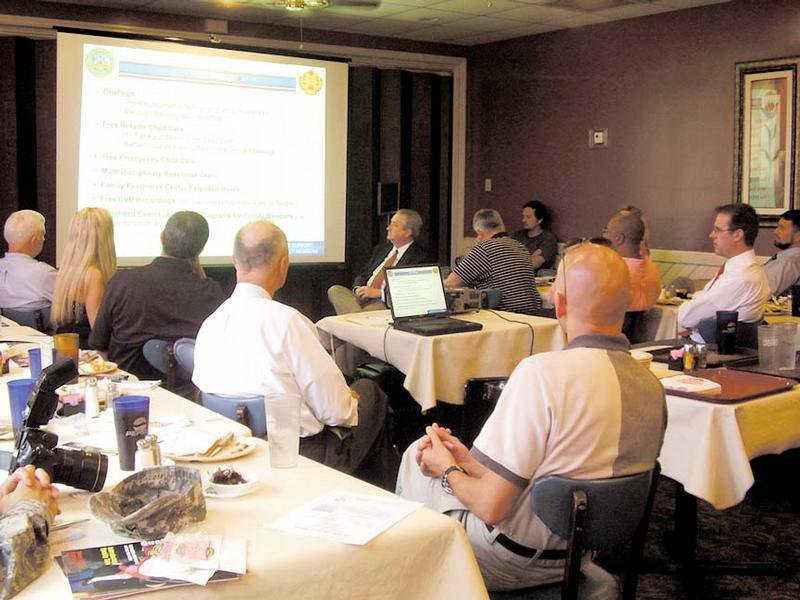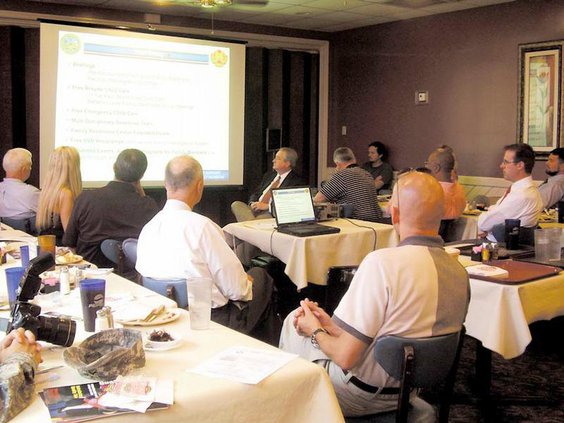With the continuing deployments of 3rd Infantry Division soldiers to Iraq, the focus of the Hinesville Rotary Club’s meeting on Tuesday was how the community can support the families left behind.
According to guest speaker and Hunter Army Airfield garrison commander Lt. Col. Carl Coffman, many spouses spend their time sitting “at home watching television” and worrying about their spouse serving in Operation Iraqi Freedom.
He said surrounding communities can play a key role in getting these spouses out of the house and involved in events and activities to keep them occupied with things “other than what’s going on down range.”
“What we want is the spouse to be engaged. We want her to constantly have a process: go to the gym on Monday, Wednesday and Friday, go volunteer at the hospital on Tuesday and go to my kid’s school to serve lunch on Thursday,” Coffman said. “If you can deploy a system like that for the spouses that are back home, the weeks go by faster, the months go by faster, the year goes by faster and their minds are occupied.”
The garrison commander highlighted the significance of publications such as Frontline and Quality Time, formerly The Patriot, which continually provide family members with information about upcoming local events.
“This lets them know there are things going on in the local area,” Coffman said while holding a copy of the Quality Time magazine in the air. “There’s plenty to do and go do it.”
Noting the sizeable percentage of young spouses who cannot afford owning a car that can get them to and from activities, Coffman said forming a transportation system for them could be the next big step.
“What we found in Germany (where he was previously stationed) was that if we can somehow provide transportation to those folks, they’ll go out in groups,” Coffman said.
According to guest speaker and Hunter Army Airfield garrison commander Lt. Col. Carl Coffman, many spouses spend their time sitting “at home watching television” and worrying about their spouse serving in Operation Iraqi Freedom.
He said surrounding communities can play a key role in getting these spouses out of the house and involved in events and activities to keep them occupied with things “other than what’s going on down range.”
“What we want is the spouse to be engaged. We want her to constantly have a process: go to the gym on Monday, Wednesday and Friday, go volunteer at the hospital on Tuesday and go to my kid’s school to serve lunch on Thursday,” Coffman said. “If you can deploy a system like that for the spouses that are back home, the weeks go by faster, the months go by faster, the year goes by faster and their minds are occupied.”
The garrison commander highlighted the significance of publications such as Frontline and Quality Time, formerly The Patriot, which continually provide family members with information about upcoming local events.
“This lets them know there are things going on in the local area,” Coffman said while holding a copy of the Quality Time magazine in the air. “There’s plenty to do and go do it.”
Noting the sizeable percentage of young spouses who cannot afford owning a car that can get them to and from activities, Coffman said forming a transportation system for them could be the next big step.
“What we found in Germany (where he was previously stationed) was that if we can somehow provide transportation to those folks, they’ll go out in groups,” Coffman said.




